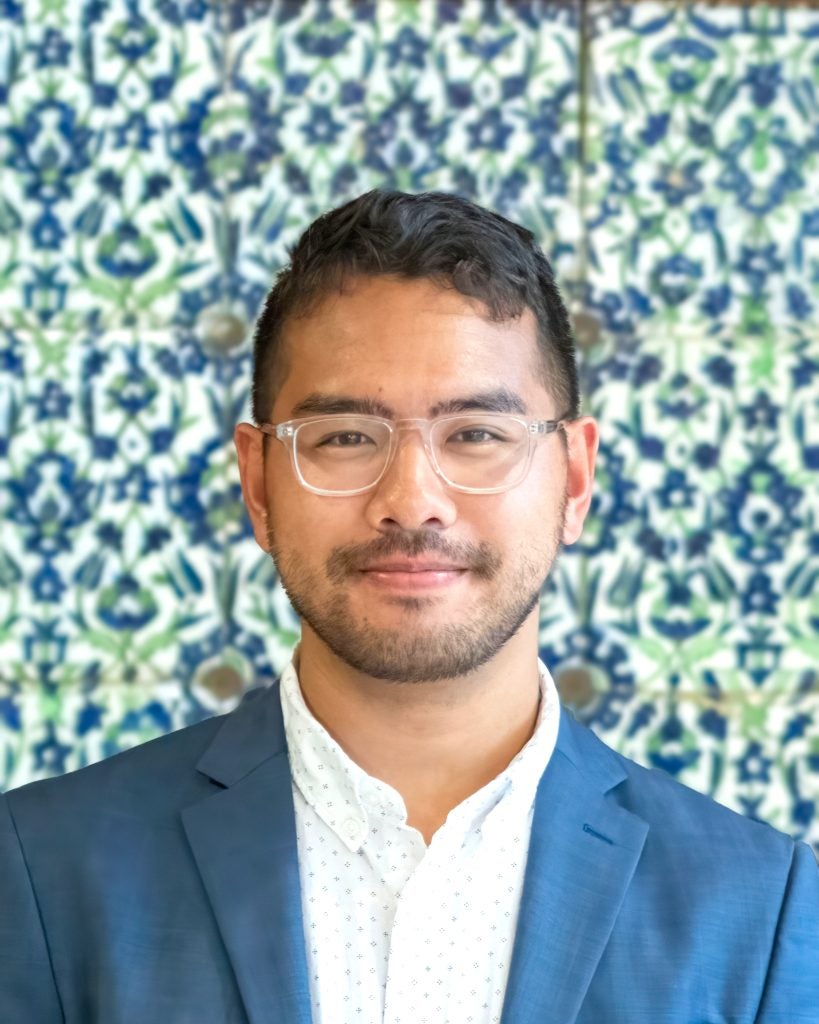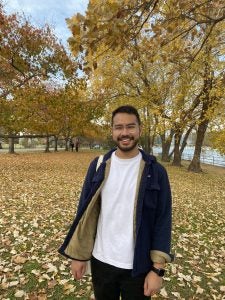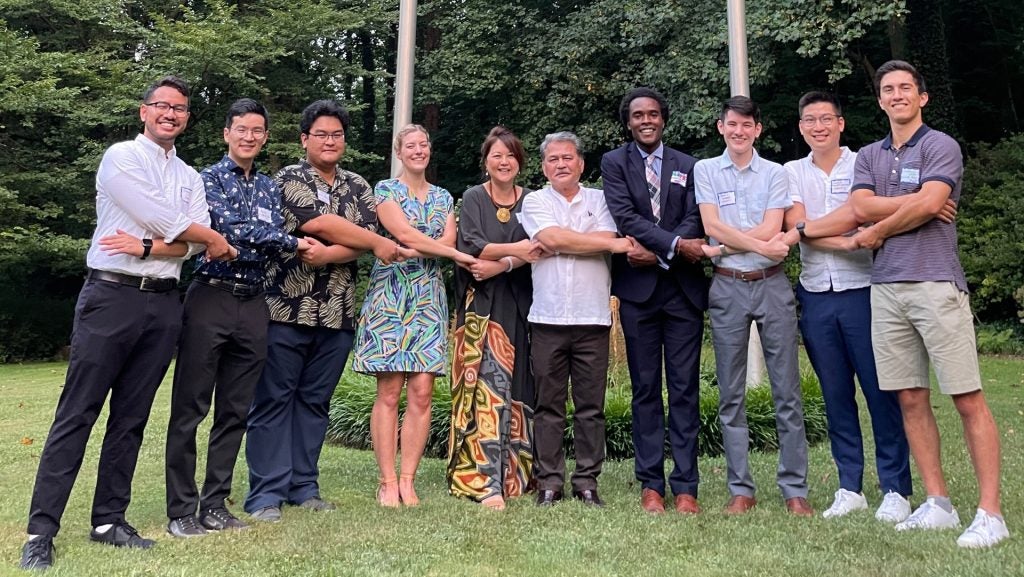
It wasn’t long after Andreyka Natalegawa (MASIA’22) first moved to Washington, DC, in 2017 that he was introduced to the exciting opportunities offered by the Asian Studies Program at the Walsh School of Foreign Service (SFS). Already an emerging expert on Southeast Asian politics, Natalegawa quickly connected with dozens of similarly dedicated practitioners who had gotten their start at Georgetown University.
“I invariably came away from these meetings impressed by the degree to which the Georgetown experience was a formative moment in their academic and professional careers,” he says. “I pretty quickly realized that I wanted to experience Georgetown and the MASIA [Master of Arts in Asian Studies] program for myself and was particularly drawn to the opportunities that would be offered by the university’s access to Washington’s resources, as well as its world-class faculty.”
Natalegawa took the plunge and decided to apply. A few short years later, he is graduating from the MASIA program with robust expertise on Southeast Asian affairs and a deep appreciation for the community he has found in his program and his city at large.
A “Top-Notch” Experience

Raised in Jakarta, Indonesia, the second-year graduate student arrived in DC determined to raise the profile of a growing and dynamic region that is often overlooked by U.S. policymakers. Natalegawa says that MASIA’s wide range of offerings on Southeast Asia was a critical factor in his decision to apply to the program.
“While Southeast Asian studies is generally underfunded and underappreciated in the United States,” he says, “Georgetown’s MASIA program was able to offer me a top-notch array of courses focused on the region.”
Before enrolling, Natalegawa consulted with current and former students and a number of MASIA faculty members about their experiences at SFS. He says that their excitement about answering his questions — as well as the actual content of their answers — helped convince him that MASIA was a program where he would thrive.
“I chose the MASIA program because of its unparalleled faculty of scholars, practitioners and policymakers,” Natalegawa adds. “I was drawn toward the MASIA program’s small cohort size, which allows for more meaningful connections both among students and between students and faculty.”
Once he arrived at SFS, Natalegawa was equally intentional about the connections he made and the trajectory he charted within the program. Already confident in his interest in Southeast Asian studies, he set out to explore additional themes and policy areas by taking advantage of MASIA’s wide course offerings.
As a result, Natalegawa says, he is graduating with an eye on emerging trends in the region. “I wanted to use my time at Georgetown to expand my functional knowledge in areas in which I had less experience. I have been able to take classes on cybersecurity, economic statecraft in the Indo-Pacific, and U.S.-China technology competition, all of which have contributed to my growing interest in digital and technology issues in Southeast Asia,” he explains.
Creating a Community
Natalegawa is thankful for a supportive network of faculty members and classmates who have encouraged and advised him during his time at MASIA, a community for which he was especially grateful during his first year, which was moved online due to the COVID-19 pandemic.
“I initially anticipated that transitioning to online learning would be difficult,” he adds, “But all of my professors were able to deliver rewarding and exciting educational experiences even while we were all remote. I greatly appreciate the significant amount of time and effort that faculty and staff had to put in to make sure that we were still receiving a meaningful Georgetown experience in a remote setting.”

To make up for the physical distance between them, Natalegawa and his classmates found ways to build community online, meeting regularly despite the fact that many worked and lived on different continents. Meeting on campus for the first time after a year of distance learning, he says, was a highlight of his Georgetown experience. “Seeing the campus so vibrant and full of life after a difficult year was a very special moment that I won’t forget.”
The bonds Natalegawa and his cohort had forged online translated to in-person community during their second year at MASIA. He describes trading ideas and disciplinary perspectives with his classmates as some of his favorite memories. “I strongly value the sense of community that we have been able to build during our time in the program,” he says.
Not only did his classmates’ support and encouragement add to his social experience at SFS, Natalegawa explains, but their wide-ranging interests allowed him to build unexpected professional and academic connections as well. According to Natalegawa, this type of cross-pollination is one of the features of his MASIA experience that he values most.
“I am going to miss the opportunity to engage with Georgetown’s broad and multidisciplinary academic environment,” he says. “My professional network tends to be fairly siloed, as most folks exclusively focus on Southeast Asia or other parts of the Indo-Pacific. Attending SFS allowed me to connect with folks who focus on other parts of the world or look at international affairs through different lenses (whether through the prism of security, economics and trade or science and technology), which in turn has allowed me to engage in new ways of thinking.”
Natalegawa also credits an engaged community of faculty members with encouraging him to make the most of his MASIA experience, both inside and outside of the classroom. “In my experience, MASIA faculty are deeply invested in the success of their students, and have been very helpful anytime I need help or guidance on both academic and professional issues,” he says.
Looking to the Future
As Natalegawa looks ahead to graduation, he is also reflecting on time at SFS. While he admits that attending graduate school during COVID has come with a host of challenges, he is proud of the professional, academic and personal growth the past two years have brought about.
Slowing down and staying home during his first year at SFS, Natalegawa says, allowed him to explore the local communities right outside his door in DC. During the pandemic, he took up running as a way to explore the city. “It’s a great way to feel connected to and engaged with the city, and it was particularly helpful during the early stages of the pandemic when it was easy to feel disconnected and isolated,” he says.

Natalegawa also worked to counteract this feeling by building community with classmates, professors and fellow regional practitioners based in DC. As part of his efforts to raise the region’s profile in the eyes of Washington policymakers, he has helped run the DC Asia Policy Network, which includes more than 2,000 professionals working on Asia policy issues.
For young scholars and practitioners focused on Asia like himself, Natalegawa advises looking into the MASIA program. “While most Asian Studies programs in the United States tend to focus more on East Asia, Georgetown’s MASIA program offers fantastic opportunities for folks interested in learning more about other parts of Asia,” he says.
“As someone who was specifically looking for a program that would offer a strong courseload on Southeast Asia (a desire that has been fulfilled in my time at Georgetown), I strongly encourage folks interested in Southeast Asia to consider the MASIA program.”
After graduation, Natalegawa will continue in his role as a research associate with the Southeast Asia Program at the Center for Strategic and International Studies, a position in which he says he will continue to leverage the regional expertise he developed at MASIA. He explains, “My time in the SFS has allowed me to ground my work in a robust academic foundation, refine my qualitative and quantitative skills, hone my writing skills and find my voice as an analyst.”